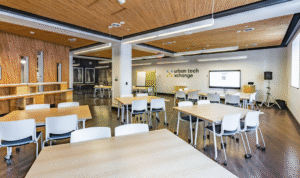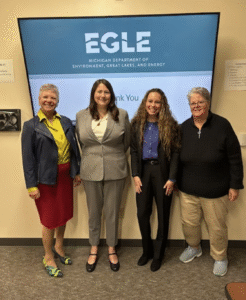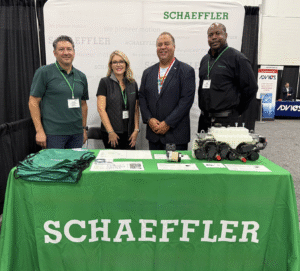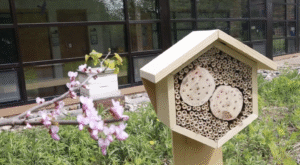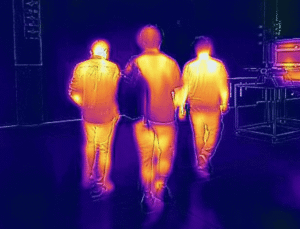
- Kim Kisner
- Community
- 08/26/2022
The Detroit Framework Agenda is Focused on Strategic Roadmap to Create a More Sustainable City
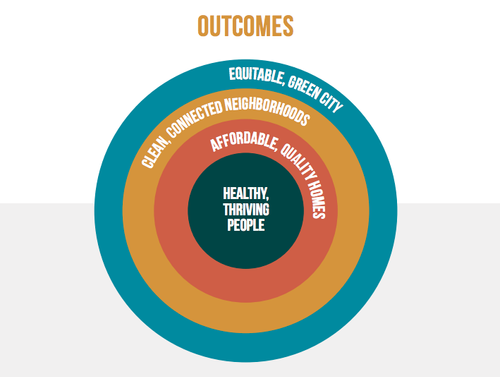
In June 2019, the City of Detroit’s Office of Sustainability published the city’s first Sustainability Action Agenda, a strategic roadmap to create a more sustainable city.
In order to develop the agenda, a full year was spent engaging with 6,800 Detroiters to understand their vision for a more equitable, prosperous, and environmentally sustainable city.
The city hired 14 sustainability ambassadors, created a Sustainability Advisory Commission, convened an interdepartmental working group of 29 city departments, distributed online and in-person surveys in five languages, and used the coUrbanize digital platform to reach Detroiters online.
This engagement helped to define four desired outcomes:
- Healthy Thriving People
- Affordable Quality Homes
- Clean, Connected Neighborhoods
- An Equitable Green City
Across these four outcomes, the city is committed to achieving ten goals and implementing 43 actions collectively called the Detroit Sustainability Action Agenda Framework outlined below.
Teams have been working over the past two years toward these goals, and recently the city was listed as #31 of 50 of the greenest cities in the U.S.
Amid several challenges and roadblocks, the city teams have worked diligently toward the action items and goals for the past two years. You can view a two-year progress update to read more about the work that’s been done and the success stories.
DETROIT SUSTAINABILITY ACTION AGENDA FRAMEWORK FOR HEALTHY THRIVING PEOPLE:
Goals & Actions:
Increase access to healthy food, green spaces, and recreation opportunities
1. Provide nutrition and environmental education at recreation centers and parks
2. Create local food purchasing guidelines for city-funded programs
3. Improve access to high quality, healthy food at grocery stores
4. Renovate existing and create new parks throughout the city
5. Expand sports recreation opportunities for youth

Improve air quality and reduce exposure to pollution
6. Expand local air quality monitoring system
7. Create citywide truck routing network
8. Increase tree plantings in vulnerable areas
9. Reduce emissions from city vehicles
Advance equity in access to economic opportunity
10. Expand green jobs training and workforce development programs
11. Prepare Detroit residents for city employment opportunities
12. Launch a digital inclusion program
13. Expand wireless internet access on city buses
14. Launch a diversity, equity, and inclusion initiative
AFFORDABLE QUALITY HOMES
Goals & Actions:
Reduce the total costs of housing, including utilities
15. Improve access to utility efficiency programs
16. Expand home plumbing repair programs
17. Implement and expand upon the Blue Ribbon Panel’s water affordability recommendations
18. Establish affordable housing preservation goals for building owners receiving city incentives
19. Increase access to information on existing affordable housing
Improve the health and safety of existing and new housing
20. Expand lead poisoning prevention initiatives across the city
21. Create a residential lead abatement training pilot program
22. Develop green building guidelines for new developments receiving city incentives
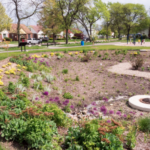
CLEAN CONNECTED NEIGHBORHOODS
Transform vacant lots and structures into safe, productive, sustainable spaces
23. Improve processes to purchase city-owned vacant lots
24. Support neighborhood-based efforts to care for vacant lots and structures
25. Develop a fee structure and associated rules for irrigation-only water accounts
Reduce waste sent to landfills
26. Launch a citywide recycling campaign
27. Expand curbside recycling to multifamily buildings
28. Expand recycling to public spaces and all city facilities
29. Develop a best practices framework for commercial-scale compost operations
30. Launch residential composting pilot program
Make it easier and safer to get around Detroit without a personal vehicle
31. Improve mobility connections between neighborhoods and job centers
32. Implement safety measures to reduce crash severity
33. Expand Detroit’s protected bike lane network
EQUITABLE GREEN CITY
Enhance infrastructure and operations to improve resilience to climate impacts
34. Create neighborhood scale, distributed green infrastructure projects
35. Incorporate green stormwater infrastructure into street redesign and greenway projects
36. Integrate climate change impacts into hazard mitigation planning
37. Improve resident access to sustainability-related city services
38. Expand emergency preparedness and communication tools
Reduce municipal and citywide greenhouse gas emissions
39. Develop a greenhouse gas assessment and climate action strategy
40. Increase the adoption of solar photovoltaic technologies
41. Enhance energy and water efficiency at city-owned facilities
42. Launch Mayors’ Challenge Program for commercial buildings
43. Develop an electric vehicle infrastructure strategy
Kim Kisner
- All
- Business
- Community
- Education
- Events

Founded in 1965, Gensler is a global architecture and design firm working across sectors including urban development, commercial real estate, and civic infrastructure. SBN Detroit sat down with Najahyia Chinchilla, senior associate and sustainability consultant, to discuss mass timber, embodied carbon, and what sustainable construction means for Southeast Michigan. Q: Why is wood re-emerging right now as a serious option for large-scale, urban construction? A: Mass timber blends strength, sustainability, and design quality in ways few materials can. Wood has...
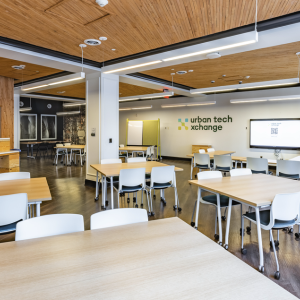
Now in its fourth year of operation, Urban Tech Xchange (UTX) has become a living laboratory where emerging technology startups can test, refine, and validate smart urban systems in real-world conditions. Launched through a collaboration between Bedrock, Bosch, Cisco, and Kode Labs, UTX builds on the foundation of the Detroit Smart Parking Lab (founded earlier by Bedrock, Ford, MEDC, and Bosch) expanding its scope beyond parking into logistics,...
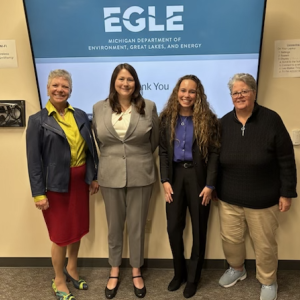
Butzel is one of Michigan’s longest-standing law firms, advising businesses across industries on regulatory compliance, environmental law, and complex commercial matters. As environmental expectations evolve alongside shifting regulatory realities, the firm plays a key role in helping companies navigate both legacy challenges and emerging risks. SBN Detroit interviewed Butzel shareholder Beth Gotthelf to discuss how environmental compliance, sustainability, and innovation are intersecting today — particularly in Southeast Michigan...


